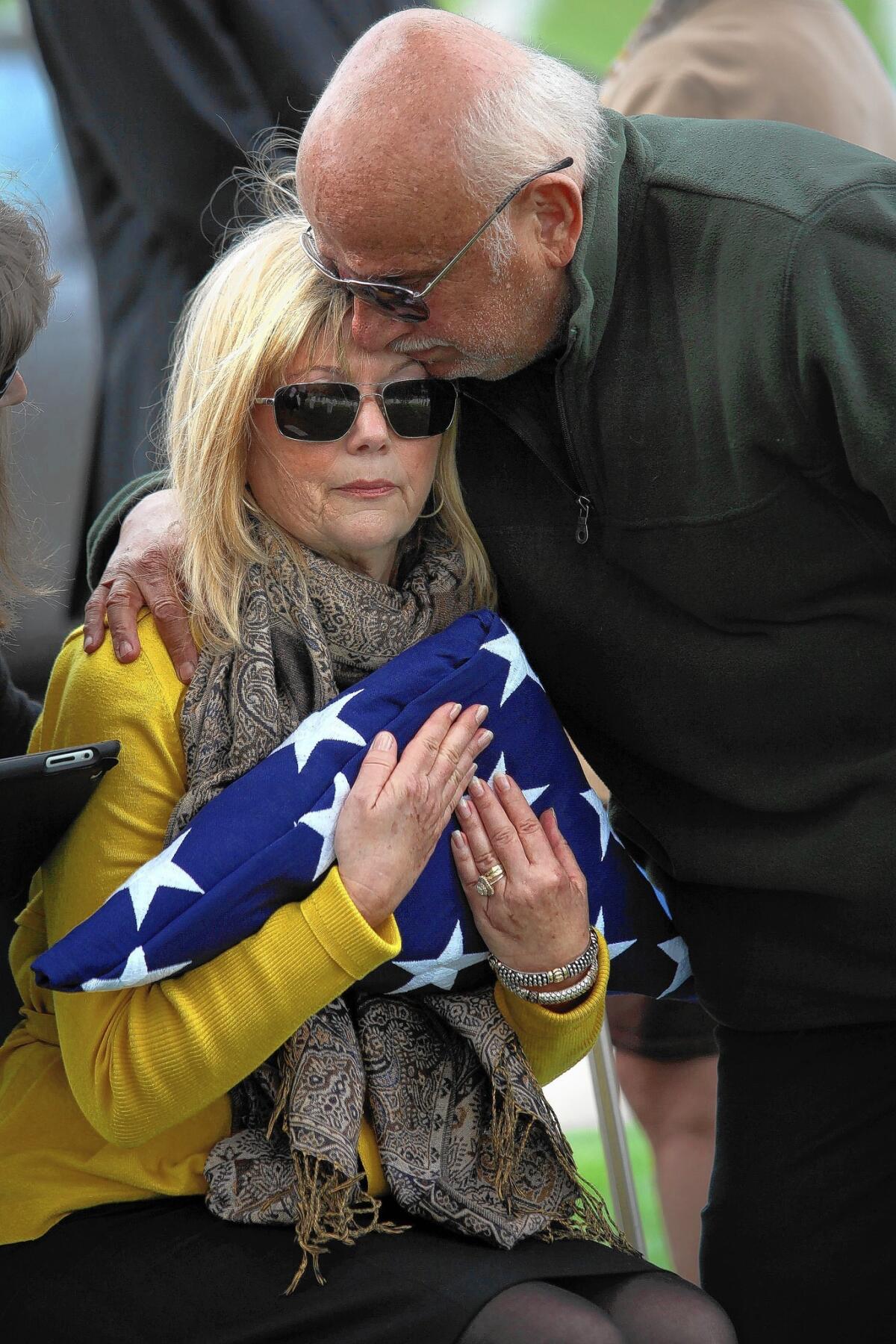Almost 60 years later, a fallen airman finally gets his due

- Share via
Jill Ellman was only 8, but she remembers military officials heading up the driveway and knocking on her family’s door with the news that her father’s Air Force bomber had crashed off the coast of Newfoundland.
The news had barely sunk in when the telephone rang with an update: Her father was safe. Her mother broke out a bottle of champagne. “Everyone was celebrating,” Ellman recalled.
But a few hours later the phone rang again, and the celebrating stopped. Only one crew member had been pulled from the ocean, and it wasn’t her dad.
Searchers discovered an empty life raft, but never found her father.
That was in 1957 during the Cold War, when international tensions were high. Air Force officials refused to talk about her father’s mission. He was part of the military’s elite Strategic Air Command; official records called his flight a training exercise.
His family learned to live with that explanation, but Ellman — his only child — was always nagged by doubts.
Before the Air Force hustled them off the military base in upstate New York, her family heard rumors that her father had been shadowing a Russian plane, with Soviet officials onboard, when an emergency call was broadcast from his B-47 and the three-man crew bailed out.
When Ellman went to college in Washington, D.C., she began trying to verify that. She knocked on doors at the Pentagon, filed Freedom of Information requests, tracked down the captain of the Canadian ship that had rescued the lone survivor of the crash. She even flew, with her husband and daughter, to the coast of Newfoundland, to get as close as possible to the spot where her father last made contact.
::
Ellman learned enough to convince herself that her father was on an intelligence mission when his aircraft went down.
And the more she discovered about his service, the more she resented the official silence that surrounded his disappearance.
She began paying attention to the military tributes for those killed in Afghanistan and Iraq. Her father had lost his life trying to protect our country. “But there had never been anything for my dad. Never a funeral, never a memorial, never a marker,” she said.
“I felt like he was cheated out of that and I wanted it for him.”
On Wednesday, Ellman got her wish, when her father — Air Force Capt. Paul Pascal — was honored in a military ceremony at Westwood’s National Cemetery.
His memorial marker notes the high points of his military career: his Purple Heart, his medals, his combat flights in World War II and service during the Korean War.
Beneath the accolades, his family’s inscription offers a public expression of appreciation, absent for almost 57 years: LOVE. GRATITUDE. SHALOM.
::
The service had all the trappings of a military funeral: the color guard, the rifle volley, the ceremonial presentation of the American flag, the bugler playing taps. A squadron of World War II-era planes roared by overhead, its “missing man” formation — in which one plane peels off — an aerial salute.
But Ellman’s eulogy was less a tribute to the fallen airman than a paean to the father she lost.
The dad who taught her to ski and ice skate, to recognize the constellations and track the stars; who lulled her to sleep with Yiddish lullabies. The neighbor who’d pull kids through winter’s snowy streets on sleds attached to his car. The man who befriended the base’s only black family, while other families shunned them.
For much of her life, those memories were all she had of her father.
Her research into his military service kept hitting dead ends: redacted files, failing memories, historical omissions. “It seemed,” she told me, “like everything about him was being wiped off the face of the Earth.”
But ultimately her quest delivered insight that brought her closer to her father.
She’d heard stories about her father’s exploits from her mother, who died of cancer 33 years ago. He’d survived an earlier brush with death during World War II, when his plane went down in 1943 over occupied France.
The military listed him “killed in action” and shipped his belongings home. Months later, with help from the French underground, he turned up.
Ellman had never realized how much courage his survival required, until last year when she was searching the National Archives and found her father’s handwritten 30-page account of the trek that kept him alive: He’d walked over the Pyrenees mountains, hiked through Spain and made his way to safety in the British port of Gibraltar.
Not bad for a high school dropout from South Philly, Ellman thought. “He gets plopped down in the middle of France, surrounded by Nazis. He’s Jewish and manages to escape, with the help of a lot of really good and really brave people.”
Her father’s resolve fueled her determination to have his final sacrifice acknowledged. “It gave me more of a sense of what he was like, what he went through. He never gave up,” she said.
So never giving up was the least his daughter could do.
“There are families all over this country who have lost someone in the military and there’s no body,” said Ellman, who lives in Tarzana. “A lot of people don’t think about that and what it means. It’s hard to find closure. You do, and you move on with your life. But it’s really important to honor those people.
“And that’s what this is about. It’s not about finding the answers,” she said. “It’s all about honoring my father.”
More to Read
Sign up for Essential California
The most important California stories and recommendations in your inbox every morning.
You may occasionally receive promotional content from the Los Angeles Times.











